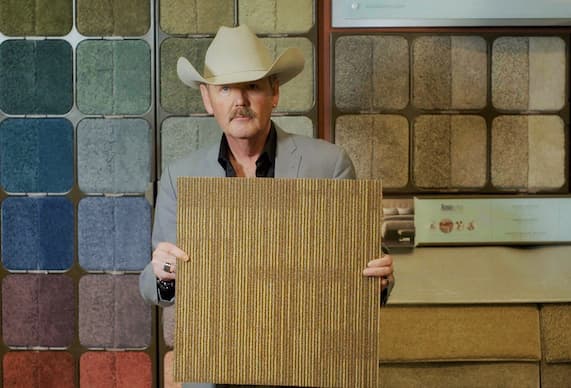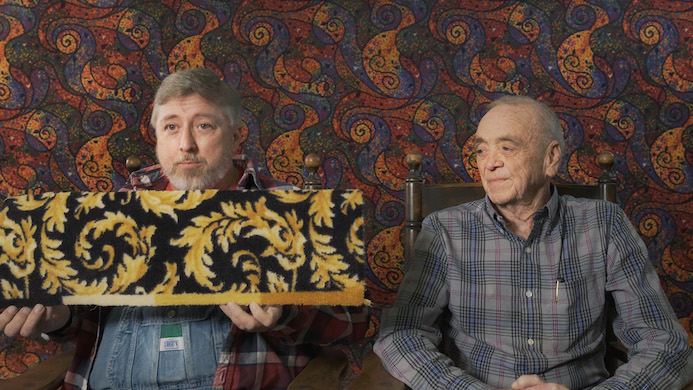On the Ground at ‘the Carpet Capital of the World’
The majority of ‘Carpet Cowboys’ is devoted to Roderick James, and it’s easy to understand why: The self-styled entrepreneur is, if not bigger than life, then bigger than Dalton, Georgia.

“It takes all sorts”: This was the thought that occurred repeatedly to me while watching “Carpet Cowboys,” the feature debut by documentarians Emily MacKenzie and Noah Collier. Americans don’t have a lock on eccentricity, but there is something deep in the heart of this film that is uniquely home-grown. We are, after all, the country of Edgar Allan Poe, Albert Pinkham Ryder, Nathaniel Hawthorne, John Harvey Kellogg, and other notables whose individualism was inseparable from their idiosyncrasies. Add to this far-from-encyclopedic list the esteemed carpet entrepreneurs of the American South.
“Carpet Cowboys” is set in the industrial environs of Dalton, Georgia, and then winds its way through a number of byways, ending up on a sun-raked beach at the Philippines. In a similarly rambling manner, we’re introduced to a bevy of businessmen involved in carpet manufacturing, even though our attention is ultimately led to Roderick James, a textile designer whose relationship with the American dream proves increasingly equivocal.
Although the picture is book-ended by scenes featuring Mr. James, the first person to speak on camera is the president of LGM Technical Carpet Services, Lew Migliore. He testifies to how he ended up in the flooring industry, relating a tale of dollars, dirt, and, in a roundabout way, the theory of gravity. “I swear to God, this is a true story”: Mr. Migliore needn’t plead; his conviction is real.
Not soon thereafter, a nonplussed woman seated in what looks to be a hotel conference room turns her laptop around to show us a video extolling the benefits of “Dalton, Georgia, the Carpet Capital of the World.” We not only learn that 85 percent of all carpeting in the United States is manufactured at Dalton, but that this modest township exports close to 50 percent of the world’s carpets. The video ends with a pun: “Prepare to be floored by what our community has to offer.” The aforementioned woman, ever mum, looks askance and — cut.

We’re subsequently introduced to Lloyd and Doug Caldwell, the proprietors of a father-and-son business that’s been up-and-running for 50 years. After the younger Mr. Caldwell relates a story about the color mauve and the vagaries of fashion, Lloyd recounts an industry “put together by a bunch of North Georgia hillbillies. And half of ’em couldn’t read or write, you know.” One thing, Lloyd Caldwell intimates, leads to another.
As does “Carpet Cowboys.” There’s Lee Phillips, the head of a stress-testing laboratory that involves, among much else, people diligently walking in circles on carpet samples and a fridge full of animal feces and synthetic vomit. We also meet the proudly anti-carpet Harry Ward, a broad-beamed 60ish tradesman who, after working in the business for some 20 years, took up stonework after seeking divine guidance. His prize array of anthropomorphic rocks prompts him to wax philosophic in a manner that Leonardo might have appreciated.
The majority of the film, though, is devoted to Mr. James, and it’s easy to understand why. He’s the proverbial fish-out-of-water: a transplanted Scotsman who favors cowboy hats, American flag scarves, lassoes, and, not least, initiative. He’s a self-styled entrepreneur who is, if not bigger than life, then bigger than Dalton, Georgia.
Mr. James shows off portraits he’s made of local citizens — “That’s carpet, okay?” — and, in a fascinating scene, informs a group of local musicians how he takes inspiration from the natural world. “You’d bring nature indoors for people,” his friend and constant companion, Jon Black, observes. Mr. James confirms that God’s handiwork does, in fact, funnel its way into his designs.
Mr. James undergoes dilemmas that are personal, financial, and, in the end, political. There’s a lesson to be had in this lone man’s odyssey, yet you get the feeling that Mr. James is withholding more than he’s telling and that the filmmakers are too circumspect to give him the requisite nudge.
There’s much that is being papered over, we feel, especially following upon the openness and generosity of the movie’s other subjects. All of which shouldn’t forestall anyone from seeing this gently stated, if sometimes doubting, valentine to class, carpeting, and country life.
Correction: An earlier version incorrectly referred to a person who is not actually in the film. The reference has been removed.

